Best eSIM for Asia in 2026
Stay mobile and online when backpacking or vacating in Asia
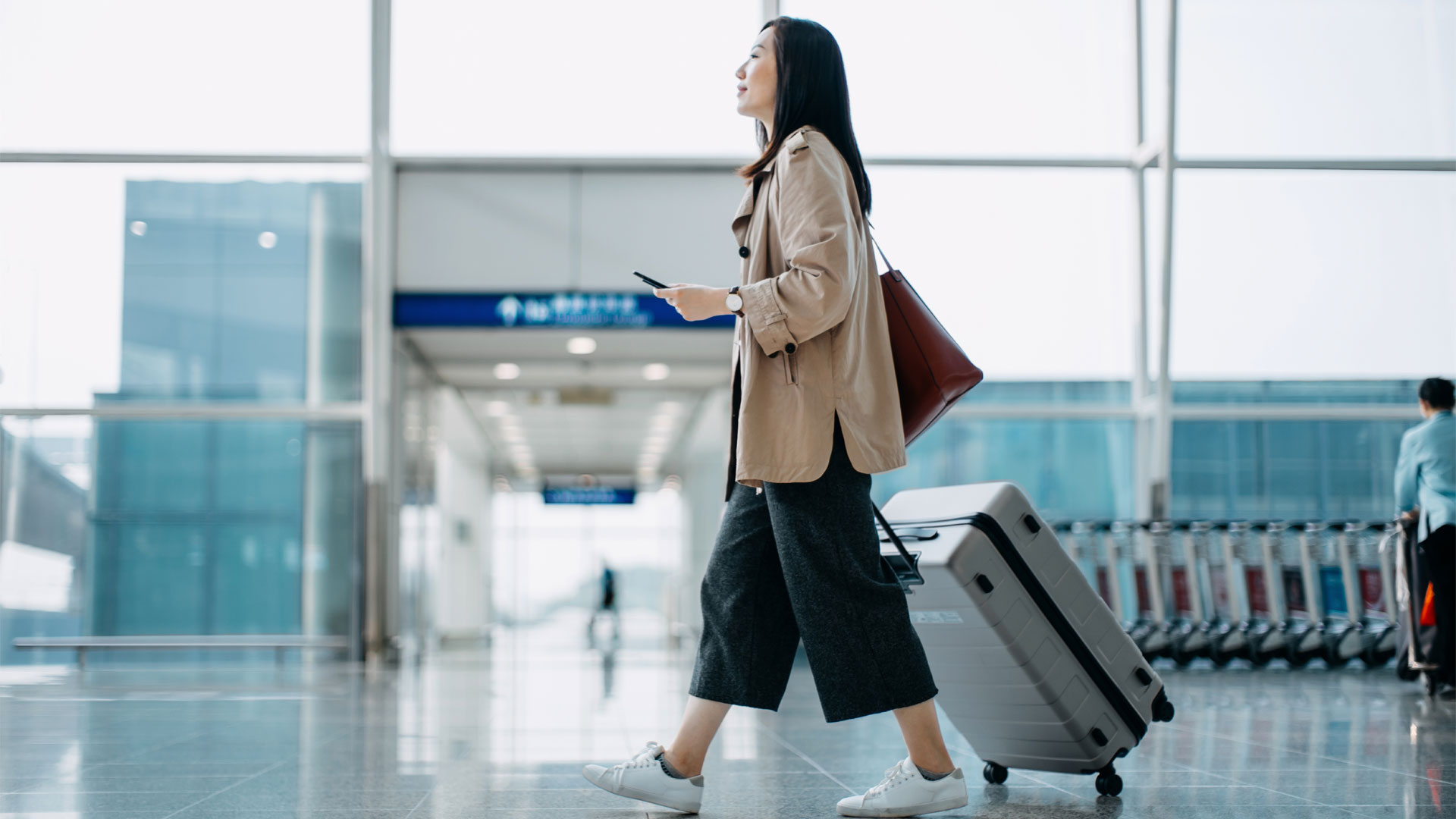
We list the best eSIM for Asia, to make it simple and easy to stay connected with your cell phone, whether you're backpacking or vacationing.
eSIMs have become more popular with travelers because of their ubiquity and convenience. Especially if you are traveling to multiple countries in one trip, bundled eSIM packages for the region can be a game-changer.
All the eSIM options listed here have bundled Asia packages that cover more than 15 Asian countries. Gone are the days of paying expensive roaming fees or getting new physical SIM cards whenever you visit another country. Instead, you can activate an eSIM and access cellular networks in multiple countries.
Asia is the second-most visited continent, with hundreds of millions of tourists visiting everywhere from China to Malaysia, South Korea, Singapore, India, and many others.
We tested many eSIM providers and chose the few that provide the best service across Asia.
Reader Offer: Get 10% off on Ubigi plans for Asia with an exclusive code
Ubigi provides users with fast and reliable internet connectivity in over 200 countries, with 5G available in 40 countries. Asia plans cover 26 countries. Simply download the Ubigi app, select the country you're headed to, and choose a plan that suits your needs —whether that's a quick 1-day plan, a flexible 15-day option, or a more extended 30-day package.
Use code TECHRADAR to redeem this offer.
Techradar Pro Approved Sponsored Offer
Provider | Asia plans | Features that sold me | Where to buy |
|---|---|---|---|
1. Ubigi | Plans start from $2 for 500MB for 1 day | Most countries covered 10% exclusive discount code- TECHRADAR | |
2. Saily | Plans start from $4.99 for 1GB for 7 days | Covers Oceania region too Premium security features included | |
3. Airhub | Plans start from $9.50 for 3GB for 30 days | Asia Pacific and Eurasia plans available | |
4. Jetpac | Plans start from $4 for 1GB for 4 days | Free access to WhatsApp chat, Uber, and Google maps when data runs out Complimentary lounge access as an add-on | |
5. Holafly | Plans start from $3.90 for unlimited data for 1 day | Fully customizable plans 5% exclusive discount code- TECHRADAR |
The best eSIMs for Asia in 2025 in full:
Why you can trust TechRadar
Best eSIM for Asia overall

Specifications
Reasons to buy
Reasons to avoid
Ubigi offers its services to over 200 destinations worldwide. A significant number of these are located in Asia, making it a great choice for anyone looking to visit the most populous continent.
There are a lot of pricing options, with various data allowances. The cheapest plan starts at $2, and it gives you 500MB for just one day. You have 1GB, 3GB, 10GB, 24GB, 25GB, and even 60GB options. In addition, you can go for the annual plan, which is $89 and gets you 5GB of data per month. Another great option is the unlimited plan- $78 for 30 days.
There are also combos depending on which countries you are visiting. For instance, there is a dedicated plan for Japan+South Korea, or Malaysia+Singapore.
Ubigi offers 5G coverage in 40 countries, and some of those are in Asia, such as Japan, South Korea, Singapore, Taiwan, and Vietnam. The app itself is pretty easy to use and install, even if you’re a newbie. On the off-chance you encounter issues, don’t fret, as there are plenty of guides and videos on the official website.
The eSIM provider has several interesting features as well, such as seamless data tethering without any restrictions. This allows you to share your data, so if you’re traveling with someone, the other person doesn’t need to get another eSIM, and you can just share your data with them.
Unfortunately, there is no phone or email support, but chances are you probably won’t need it anyway.
In case you do, you’ll have to use the contact form or the live chat. Also, do note that Ubigi is still a data-only provider, so you will need your primary SIM card to make phone calls or send SMSs. You can still make VOIP calls through apps like WhatsApp.
Read our full Ubigi review.
Best eSIM for Asia for security
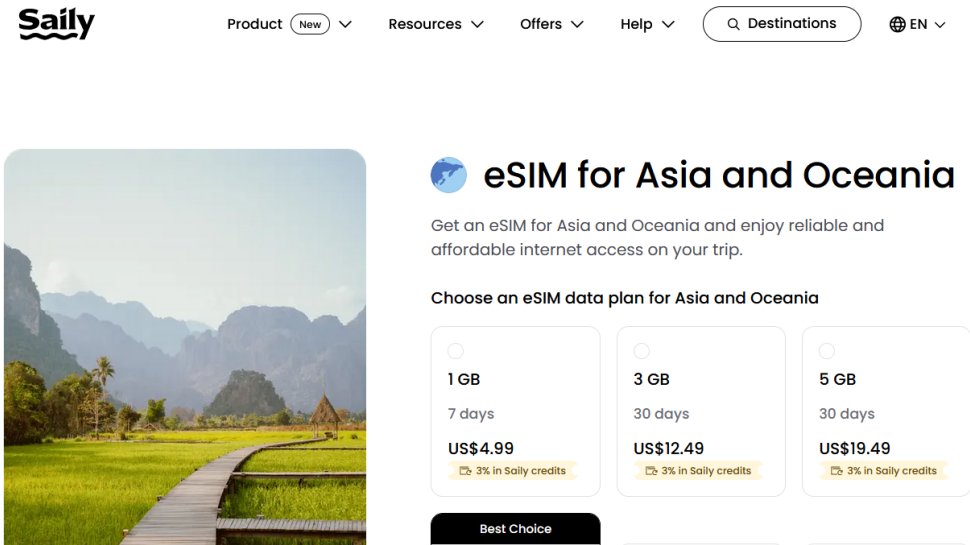
Specifications
Reasons to buy
Reasons to avoid
Backed by Nord Security, the company behind NordVPN, Saily provides coverage in over 200 countries, with 19 countries in Asia. The Asia plan also covers Oceania, including Australia and New Zealand, unlike other counterparts.
What's unique about the brand is its premium security features, which are already included in the eSIM packages. Users can enjoy virtual location, web protection, and ad blocker features free of cost. I particularly like the virtual location feature, which lets you change your device location to wherever you'd like.
Users have six data plans to choose from for Asia, including 1 GB for 7 days for $4.99, 3 GB for 30 days for $12.49, 5 GB for 30 days for 19.49, $10 GB for 30 days for $35.99, 50 GB for 90 days for $95.99, and 100 GB for 180 days for $179.99. Compared to its competitors, Saily's plans are more flexible and affordable.
We also found the installation process to be straightforward. All you need to do is download the app, select the data plan, and follow the on-screen instructions to set up your eSIM. No documentation is required.
You can also buy the data plan before your trip and activate it later when you need it. One drawback worth noting is that there is no phone number provided.
Read our full Saily review.
Best eSIM for flexbility
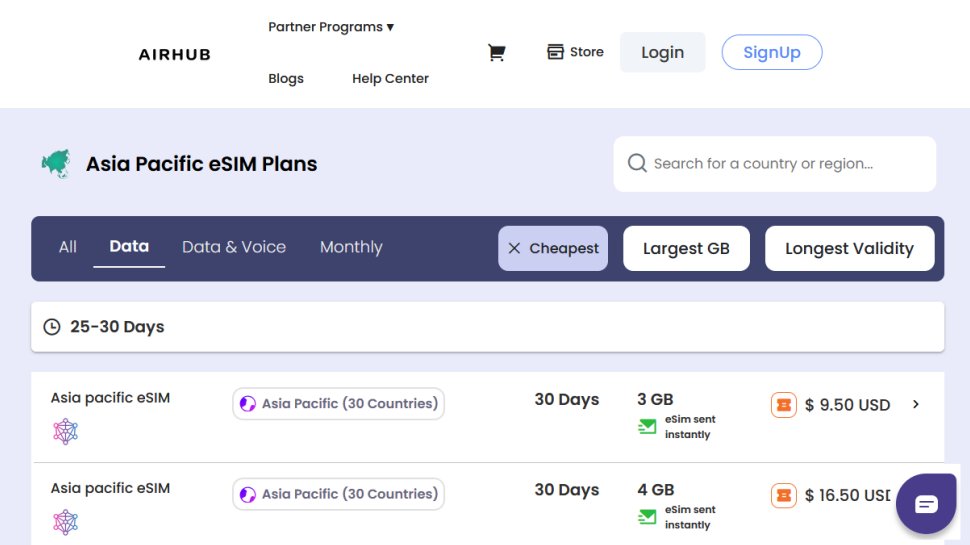
Specifications
Reasons to buy
Reasons to avoid
Airhub is a strong contender in the eSIM market, covering over 190 countries. Its Asia options are particularly impressive, divided into two categories- Asia-Pacific and Eurasia.
The Asia-Pacific plan covers 30 countries, the highest among providers I've reviewed in this list. There is also an Eurasia plan which covers 5 countries, including Turkey, Kazakhstan, Azerbaijan, Georgia, and Armenia.
Plans for Asia-Pacific start at $9.50 for 3GB for 30 days, while the Eurasia plan starts at $8.50 for 4GB for 30 days. One standout feature is the Eurasia 300GB plan for $80, a rarity in the market and an excellent choice for heavy data users.
Like its other counterparts, Airhub is also easy to install and follows almost the same process as its different counterparts. However, Airhub currently doesn’t offer unlimited data plans or phone numbers with its packages.
Read our full Airhub review.
Best eSIM for network coverage
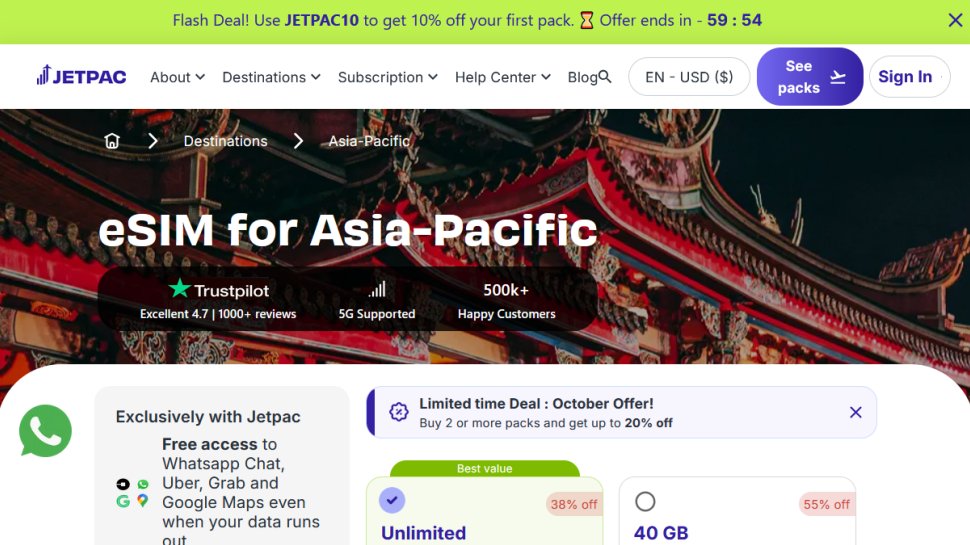
Specifications
Reasons to buy
Reasons to avoid
Jetpac is quickly making a name for itself in the eSIM market, particularly with its flexible Asia plans designed for frequent travelers. Covering both Asia-Pacific and Southeast Asia, Jetpac’s eSIM offers one of the most versatile regional options available, which is ideal for anyone hopping between destinations.
Travelers can choose between unlimited data plans lasting 3 to 30 days or tiered options ranging from 1GB to 40GB, depending on their needs. This flexibility makes Jetpac one of the best eSIMs for Asia for both short getaways and long-term stays.
What truly sets Jetpac apart are its added perks. Even after data runs out, users still get free access to WhatsApp Chat, Uber, Grab, and Google Maps, ensuring they stay connected for essential communication and navigation. Jetpac also includes airport lounge access in case of flight delays.
Installation is quick and straightforward, with no physical SIM required, though it’s worth noting that Jetpac’s plans do not include a phone number.
Read our full Jetpac review.
Best eSIM for Asia for unlimited data
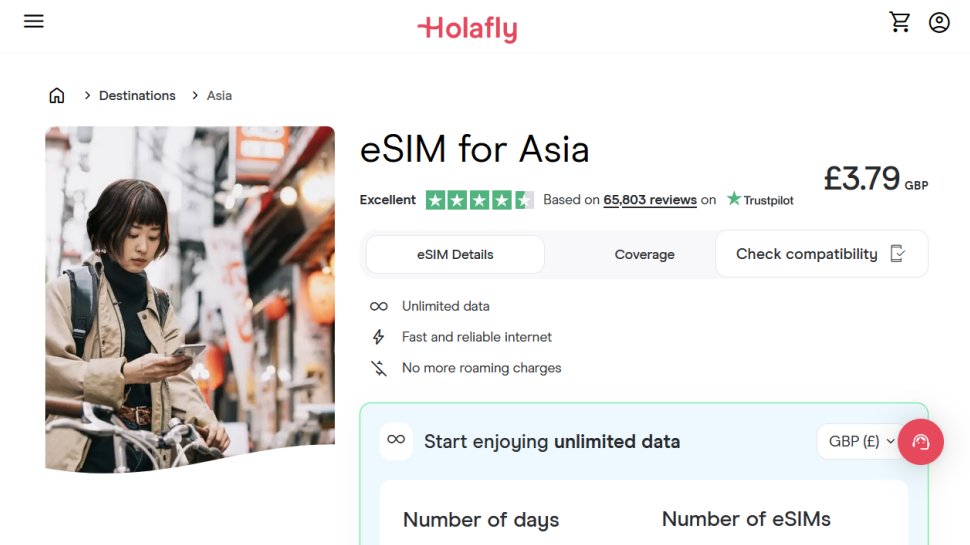
Specifications
Reasons to buy
Reasons to avoid
Holafly is an eSIM provider that offers excellent network coverage in supported countries, which include China, South Korea, Japan, Hong Kong, Sri Lanka, Cambodia, Singapore, Vietnam, Thailand, Taiwan, Singapore, Malaysia, Indonesia, Philippines, Pakistan, Macau, and Laos.
You can observe that Holafly offers coverage in 16 Asian countries, compared to Saily's 19 countries.
Flexible pricing is a major advantage of choosing Holafly. There are no standard data fees– it depends on how many days you select. For example, unlimited data for 7 days costs 34 euros ($37), and 30 days costs 83 euros ($90).
Holafly is undoubtedly expensive, but the tradeoff is enjoying unlimited data, unlike most other eSIM packages with capped data plans.
Holafly offers data-only plans without phone numbers for calling. Most eSIM providers don’t offer phone numbers because of the complicated regulations and infrastructure required to do so. The exception is when your eSIM is from a telecoms firm that has already laid the groundwork for issuing phone numbers.
Purchasing a Holafly plan is easy. After payment, you'll receive a QR code in your email. Scan this code to activate your plan and enjoy unlimited data.
Use code TECHRADAR to get 5% off.
Read our full Holafly review.
Best eSIMs for Asia FAQs
What is an eSIM?
eSIM is an abbreviation for embedded SIM. It is a digital version of a SIM card embedded directly into your smartphone, rather than the physical SIM cards you can remove or replace anytime.
An eSIM allows you to activate a cellular connection from a carrier without swapping any physical SIM. All the configurations take place on your phone, so you can connect to new networks without hassles.
eSIMs offer many advantages, including storing multiple network profiles on a single device and seamlessly switching between cellular networks when you travel.
An eSIM is also more secure than traditional SIM cards; the eSIM remains embedded in the phone if it gets missing, making tracking the location more feasible.
In contrast, someone can remove a physical SIM from a stolen or missing phone, making it almost impossible to track.
Why do I need an eSIM when visiting Asia?
Asia has 48 countries with over 4.8 billion people between them. Each country has its mobile carriers, and a standard SIM card that works in one country won’t work in another, except you have a roaming package. The issue is that roaming packages have steep costs, which leaves eSIMs as the cost-effective solution.
You can buy and activate an eSIM outside of the country you want to visit. Once you reach your desired country, you can use the activated eSIM to surf the web.
eSIM providers don’t usually own telecom networks. Instead, they tap into the infrastructure of existing mobile carriers across different countries.
They’ve negotiated network-sharing agreements that allow eSIM owners to tap into domestic networks when they visit new countries.
For instance, you live in Denmark and want to visit Thailand. You can buy an eSIM and activate it while in Denmark. When you get to Thailand, you can use the eSIM to surf the web or make calls (if your eSIM provider offers this option).
An eSIM is much more convenient than going to a physical outlet in Thailand to get a new SIM card to access a cellular connection.
Is my phone eSIM-compatible?
eSIMs became popular in 2018 after Apple released the first eSIM-only iPhone to U.S. customers. Since then, many other smartphone makers have joined the train, and virtually all new high-end smartphones now have eSIMs. All iPhones XR and above are eSIM-compatible, and the same applies to Samsung Galaxy Note 20 or Galaxy S20 and above.
Follow these steps to check if your smartphone has an eSIM slot:
For iPhones
- Open Settings > Cellular.
- Look for the Add eSIM button. This button’s presence means your iPhone is eSIM-compatible. If you can’t find this button, the iPhone is incompatible with eSIMs.
For Android phones
- Launch the Settings app.
- Select About Phone.
- Look for SIM Status or something similar (it varies depending on your smartphone).
- Look for any mention of eSIM or Embedded SIM. If you find it, your Android device is compatible. Otherwise, it is not compatible.
If you're unsure about compatibility, check your smartphone manufacturer’s website. eSIM compatibility will likely be mentioned in your smartphone’s technical specifications.
Considerations for choosing an eSIM
1. Location
eSIM providers offer different plans for different countries. The provider you’ll choose depends on the countries in Asia you want to visit. For example, if you plan to visit China, India, Thailand, and Singapore, look for an eSIM provider that offers network coverage in these four countries. The good news is that you can find an eSIM plan covering Asia.
2. Validity
How long will your data subscription last? eSIM providers offer plans lasting 7 days, 13 days, 20 days, 30 days, etc. Some even provide annual or non-expiring data plans. The plan to choose depends on the duration of your trip. If you expect to stay in Asia for a long time, it’s advisable to select a plan that’s valid for as long as possible.
3. Data usage
You must consider browsing habits when choosing an eSIM plan. If you’re a heavy internet user who streams movies or plays games online, you should be eyeing the largest data plans from your eSIM provider. But if you just need data for mundane tasks like texting and audio calling, you can pick a smaller data plan.
If the large data plans seem too costly, you can pick a smaller one and restrict heavy internet tasks to Wi-Fi when you reach your destination.
4. Customer service
Can you contact customer support if you have any eSIM issues? Ideally, the eSIM provider should have a support team you can contact via email, phone, or live chat to lodge complaints. Excellent customer service gives you peace of mind, knowing you can always get help when required.
5. Cost
Of course, it’s essential to choose a plan you can afford. Compare similar data or phone plans from different eSIM providers for a fair price. The idea is to purchase a plan that gives a good bang for your buck.
6. Coverage
Research what networks your eSIM provider uses in each country you plan to visit. It’s better to choose an eSIM provider compatible with multiple networks instead of one. This way, you’re assured of getting coverage even in less populated areas.
How we tested the best eSIMs for Asia
We tested the best eSIMs for Asia by evaluating numerous factors. To start with, we looked at how easy the setup is, the simplicity of use on the go, and the connectivity and reliability of the service. We carried out the tests using both iPhone and Android phone models in order to gauge whether the experience was the same for each, or whether one type had a greater advantage over the other. We then compared the overall results to draw up our list.
Read more on how we test, rate, and review products on TechRadar.
- You've reached the end of the page. Jump back up to the top ^
Sign up to the TechRadar Pro newsletter to get all the top news, opinion, features and guidance your business needs to succeed!
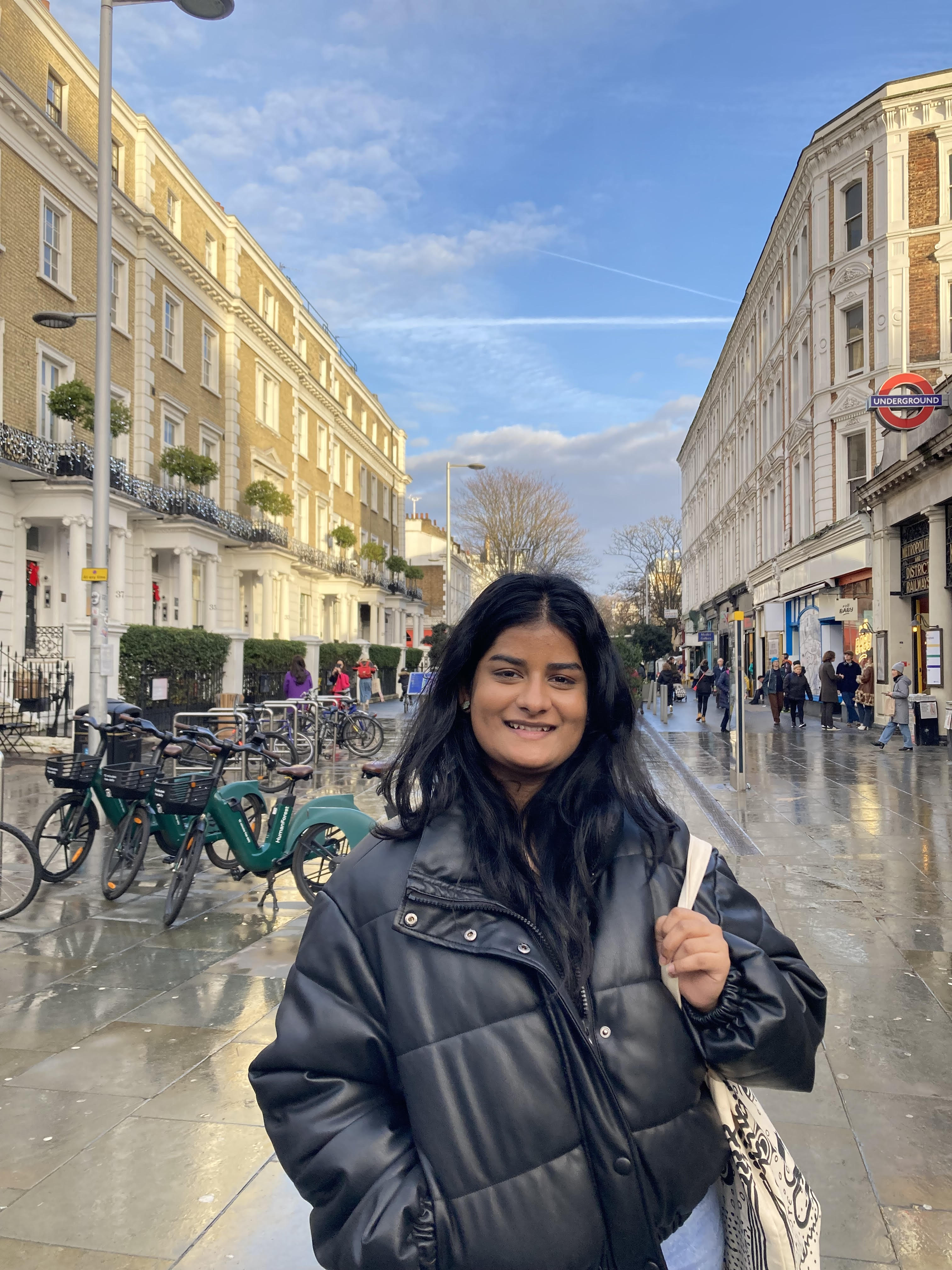
Udita Choudhary is a Content Sub Editor at TechRadar Pro where she manages several verticals including eSIM, programming and productivity. She also works on the affiliate side, managing the editorial needs of diverse clientele. She has written for publications such as Vogue Business, Marie Claire, and Homes & Gardens.
